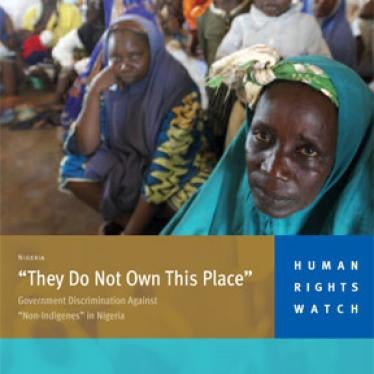(New York, August 29, 2002) - Human Rights Watch today condemned the imposition of a death by stoning sentence on a man in the northern state of Jigawa in Nigeria. Earlier this month, an appellate Sharia court in northern Nigeria upheld a stoning sentence against a 30-year old woman for having sex outside marriage.
A Sharia (Islamic law) court sentenced Ado Baranda to death by stoning in May after finding him guilty of raping a nine-year old girl. The defendant, who is in his fifties, reportedly pleaded guilty and declined the opportunity to appeal.
“The reason for his decision not to appeal has not been confirmed, but on the basis of past experience, we are concerned the trial may not have been fair,” said Peter Takirambudde, executive director of the Africa Division at Human Rights Watch. “The absence of fair trial process is especially worrying when death sentences are handed down.”
Previous trials in Sharia courts in several northern states of Nigeria have been characterized by an absence of due process. Defendants do not always have legal representation; they are often ill-informed about procedures and about their rights. Judges and other court officials frequently lack legal training.
In January 2002, for the first time since Sharia was extended to cover criminal cases, a man was sentenced to death and executed. In the trial, the defendant did not have legal representation and did not take up the opportunity to appeal.
A spokesman for the Jigawa state government was quoted on August 27 in the Nigerian newspaper ThisDay and in Agence France Presse (AFP) as saying, “In Sharia there is no compromise. The only compromise is if someone should appeal.” The government spokesman reportedly also stated that the governor of Jigawa would not intervene in the case of Ado Baranda.
Human Rights Watch called on Nigeria’s federal government to abolish the death penalty in Nigeria and ban cruel, inhuman and degrading punishments such as stoning. Despite statements from senior government officials, including President Olusegun Obasanjo and Minister of Justice Kanu Agabi, opposing such punishments and declaring them unconstitutional, the federal government has yet to prove its willingness to act.
Human Rights Watch is opposed to the death penalty in all circumstances because of its inherently cruel and irreversible nature.
“We deplore the crime of which this defendant is accused, and anyone found guilty of rape should receive a heavy sentence. However, taking another person’s life in the name of justice is not an appropriate punishment, especially when the fairness of the trial may be in doubt,” said Takirambudde.






